As part of its efforts to develop new knowledge and tools for artists, CCI periodically conducts and publishes research on the arts sector, and published the book Business of Art: An Artist's Guide to Profitable Self-Employment, now in its 3rd Edition, Second Printing!
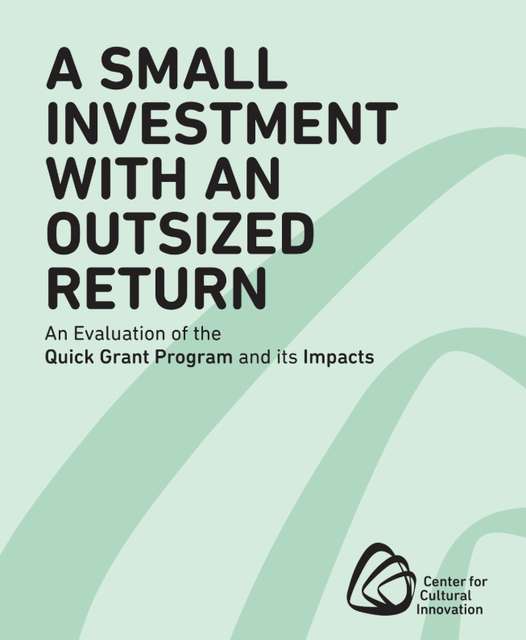 A Small Investment With an Outsized Return: An Evaluation of the Quick Grant Program and its Impacts
A Small Investment With an Outsized Return: An Evaluation of the Quick Grant Program and its Impacts(2024. 24 pages.)
In honor of Quick Grant's 15th anniversary in 2024, CCI commissioned an outside evaluator to tell the story of how a relatively small investment(a $600 microgrant) can have an outsized impact on an awardee. The report examines the impacts Quick Grant has had on California artists and arts workers, it also describes artists’ creative and financial conditions in a post-COVID-19 landscape, and culminates with recommendations for how Quick Grant can continue to impact artists and arts workers, helping them to better manage their careers and organizations, and ultimately strengthen the arts sector as a whole.
(2024. Hardback. 586 pages.)
CCI is proud to announce The Routledge Handbook of Urban Cultural Planning, a comprehensive survey of current thinking and best practices in urban cultural planning and culturally informed city planning. The new publication features 40 original contributions from leading thinkers and practitioners, including an essay by CCI President & CEO Angie Kim, titled Financing A Diverse Future through Community Ownership.
The Routledge Handbook of Urban Cultural Planning is the first effort to thoroughly examine how culture intersects with other areas of urban planning and policy including housing, economic development, transportation, climate change and sustainability, civic engagement, and public and mental health.
Preorder the book here.
(2024. 39 pages.)
A guide created through a partnership to better understand the Copyright Claims Board (CCB) as a resource for creatives between the Center for Cultural Innovation (CCI) and Stanford University’s Juelsgaard Intellectual Property and Innovation (JIPIC) Clinic
(2024. 8 pages.)
A helpful resource written by CCI's Research to Impact Lab staff for funders interested in moving ethically in the Artificial Intelligence (AI) space.
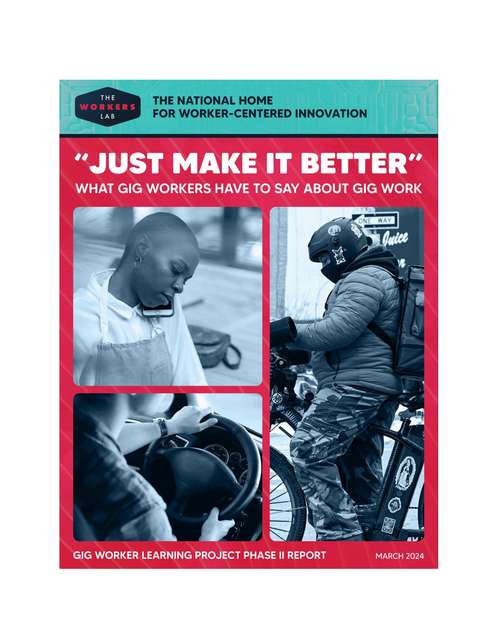
(2024. 16 pages.)
Supported by CCI and led by The Workers Lab and the Aspen Institute Future of Work Initiative, Just Make It Better." What Gig Workers Have to Say About Gig Work is a unique new piece of research on “gig” work, co-authored by active gig workers as participant-researchers. The goal of this project is to better understand gig work and workers directly from the gig workers themselves, regarding their motivations, challenges, and solutions that would impact their lives personally and professionally.
(2024. 112 pages.)
A Report to Congress prepared by the United States Patent and Trademark Office and United States Copyright Office about how intellectual property laws apply to NFTs and specific intellectual property-related challenges arising from the use of NFTs. Public comment gathered and prepared by CCI’s Research to Impact Lab.
(2021. 179 pages.)
Commissioned by CCI and led by Caroline Woolard, Spirits and Logistics details ways grantmakers, universities, and arts Institutions can begin collaborating with with the BIPOC-led cooperative movement to build the future of Art Education.
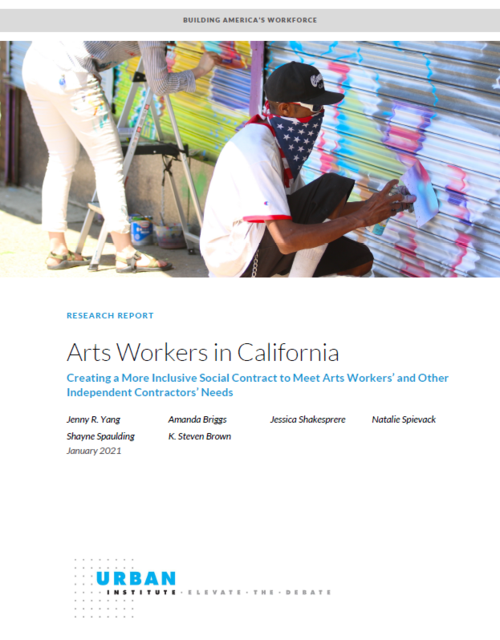 Arts Workers in California: Creating a More Inclusive Social Contract to Meet Arts Workers’ and Other Independent Contractors’ Needs
Arts Workers in California: Creating a More Inclusive Social Contract to Meet Arts Workers’ and Other Independent Contractors’ Needs(2021. 79 pages.)
In January 2021, Center for Cultural Innovation, with support from the William and Flora Hewlett Foundation, commissioned a new report to help arts advocates, labor advocates, and policy makers create more fair conditions to include more types of workers. Researched and authored by the Urban Institute, the report outlines the working arrangements of the more than 600,000 arts workers in California and sheds new light on the challenges and issues they face, particularly when working as independent contractors. It also identifies policy shifts to update systems, for those in California or nationally, that could be more inclusive of artists and others who operate outside the traditional bounds of employment.
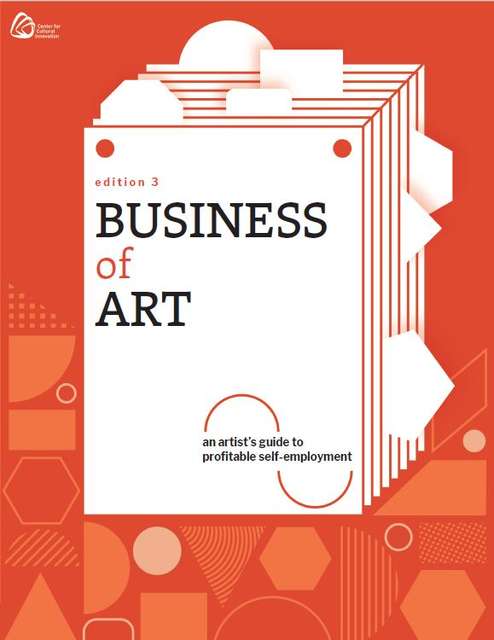 Business of Art: An Artist's Guide to Profitable Self-Employment - Third Edition
Business of Art: An Artist's Guide to Profitable Self-Employment - Third Edition(2020. Paperback. 220 pages.)
The 3rd edition of Business of Art: An Artist’s Guide to Profitable Self-Employment provides you with key knowledge, tools and resources to help you advance your art practice. This workbook reflects CCI deep commitment to the artistic community and our belief that knowledge is power.
(2020. 5 pages.)
Angie Kim shares CCI's learning and recommendations regarding relief funding during the COVID crisis.
(2019. 6 pages.)
Read CCI's learning and recommendations regarding individual donor behavior in relation to online giving and online crowdfunding platforms.
(2019. 31 pages)
Produced by Kounkuey Design Initiative for CCI's CAL-Now 2019 Convening, the Equity in the Arts toolkit leads the reader through a meaningful process for community-led design of a program, grant, or artwork.
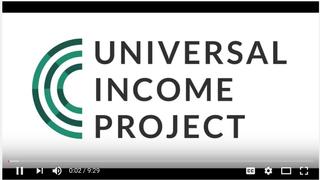
CCI President & CEO Angie Kim talks about the value of basic income and why it matters to artists. Interviewed and produced by Universal Income Project, April 16, 2017.
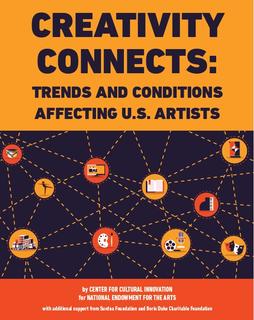 Creativity Connects: Trends and Conditions Affecting U.S. Artists
Creativity Connects: Trends and Conditions Affecting U.S. Artists(2016. 88 pages)
CCI, in partnership with the National Endowment for the Arts, is pleased to announce the launch of a new report on U.S. artists. The report describes significant changes that alter definitions of artists, how they sustain their practice, and yet-unrealized potential to contribute positively to social issues and apply creativity throughout all sectors. This research was supported by Surdna Foundation and Doris Duke Charitable Foundation. ![]() Download report
Download report
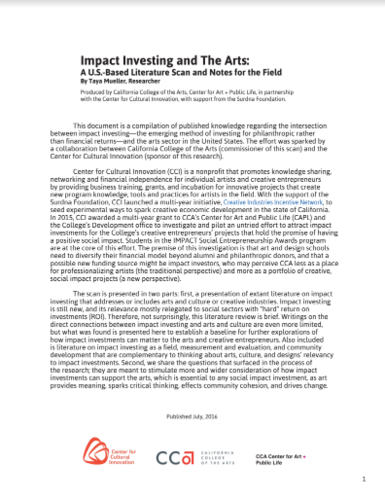 Impact Investing in the Arts
Impact Investing in the Arts(Mueller, Taya. 2016. 9 pages)
Produced by the California College of the Arts with support from CCI and the Surdna Foundation, this is a literature scan of published knowledge of intersections between the arts and impact investing. This scan was conducted at a moment when impact investing is still emerging, which led CCA and CCI to question how this kind of financial and social investing has involved and affected the arts. The scan revealed that there have been very few developments on this front, and so this scan provides a baseline of the little, thus far, that has been done to integrate and study arts with principle-based investing. (Go to CCA's site)
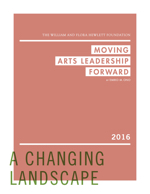 Moving Arts Leadership Forward
Moving Arts Leadership Forward(Ono, Emiko E.; The William and Flora Hewlett Foundation. 2016, 29 pages)
Authored by Emiko M. Ono and published by The William and Flora Hewlett Foundation, Moving Arts Leadership Forward summarizes the findings of a 2014 reassessment, led by Open Mind Consulting's Michael Courville, of the Next Generation Arts Leadership Initiative. A significant partner in the Initiative, CCI managed statewide re-granting programs to support professional development for individuals and innovative organizational practices aimed at strengthening skills of future field leaders.![]() Download report
Download report
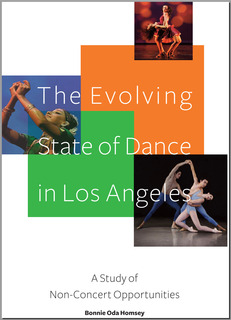 The Evolving State of Dance in Los Angeles
The Evolving State of Dance in Los Angeles(Oda Homsey, Bonnie. 2014. 29 pages)
Policy brief that is a scan and analysis of Los Angeles dance companies and venues. The task was motivated by the recognition that dance in Los Angeles is underserved in terms of performance opportunities and related funding to support creative growth and operations. Commissioned by the Center for Cultural Innovation with generous support from the Department of Cultural Affairs, Los Angeles.![]() Download report
Download report
Launched as a ten-year initiative in 2003, LINC represents a philanthropic experiment in using information, money, strategy, and partnerships to effect change in the support system for artists in the United States. LINC’s mission was to improve the ability of artists to create work, build social capital, and contribute to democratic values.
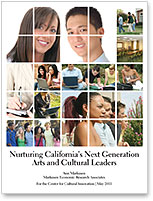 Nurturing California’s Next Generation Arts and Cultural Leaders
Nurturing California’s Next Generation Arts and Cultural Leaders(Markusen, Ann, Markusen Economic Research Associates 2011. 37 pages)
A benchmark study on the nonprofit careers of next generation arts and cultural leaders in California, conducted by research economist Ann Markusen, Markusen Economic Research Associates and commissioned by the Center for Cultural Innovation for The James Irvine Foundation and The William and Flora Hewlett Foundation.
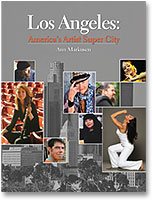 Los Angeles: America’s Artist Super City
Los Angeles: America’s Artist Super City(Markusen, Ann. 2010. 24 pages)
Policy brief on individual artists in Los Angeles and future policy implications and opportunities, commissioned by Center for Cultural Innovation.
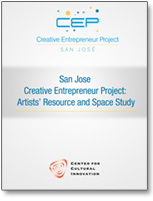 San Jose Creative Entrepreneur Project: Artists’ Resource and Space Study
San Jose Creative Entrepreneur Project: Artists’ Resource and Space Study(Markusen, Ann, Anne Gadwa and Pat Shifferd. 2008. 53 pages)
A first-ever study of San Jose individual artists’ needs commissioned by the City of San Jose Office of Cultural Affairs, in partnership with the Center for Cultural Innovation.
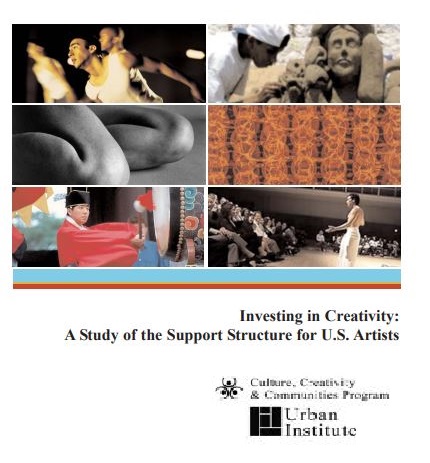 Investing in Creativity: A Study of the Support Structure for U.S. Artists
Investing in Creativity: A Study of the Support Structure for U.S. Artists(Urban Institute. 2003. 107 pages)
In 2000, a major study was commissioned by 38 funders nationally, resulting in a 2003 benchmark report produced by the Urban Institute in Washington, DC